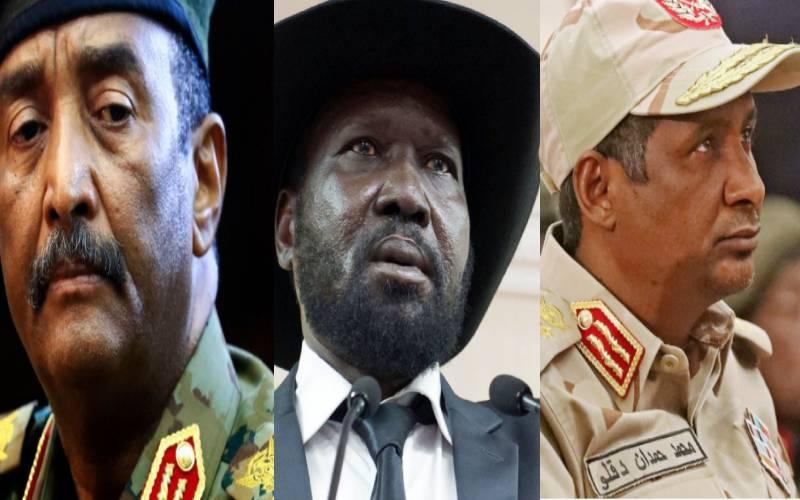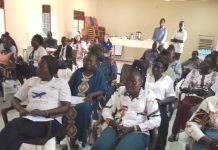Yiep Josepph
Africa-Press – South-Sudan. More than 700,000 people have already been displaced, 28 days since war broke out in Sudan on April 15, according to data from the International Organisation for Migration (IOM).
The majority of these have escaped to neighbouring countries like South Sudan, Egypt, and Ethiopia as fighting continues in Khartoum.
The Sudan War pits forces loyal to General Abdel Fattah Al-Burhan, the commander of the Sudan National Army, against the Rapid Support Forces (RSF), commandeered by Mohamed Hamdan Dagalo.
Efforts to end the bloody conflict remain a mirage as Africa, through the Intergovernmental Authority on Development, drags its feet in finding a lasting solution.
This is as fighting continues to spread in most parts of the country despite calls by the international community to silence the guns.
The effect of the war is felt far and wide. South Sudan, one of Sudan’s neighbours to the south, is currently grappling with the influx of refugees and returnees—nationals, some of whom had fled to Khartoum and other towns in Sudan after war broke out at home some years back.
IGAD has since appointed a high-level delegation headed by President Salva Kiir to try and find a lasting solution to the Sudan crisis. The move by the regional body, whose key mandate is to promote regional cooperation and integration to add value to Member States’ efforts in achieving peace, security, and prosperity, has hit a headwind with one party to the Sudan conflict, – Dagalo, who is said to be favouring the ongoing talks in Saudi Arabia that are being spearheaded by America.
Sudan is the current chair of IGAD, meaning that Kiir, William Ruto of Kenya, and Djibouti’s President Omar Guelleh – the other two members of the IGAD delegation, will be trying to persuade their ‘boss,” al-Burhan, to drop the gun and give dialogue a chance.
Sources say that Dagalo, who is said to be pro-Saudi, is jittery about the IGAD-led initiative.
During his recent visit to Juba, Buhran special envoy Daffalla A-Haj said that Khartoum is still committed to IGAD’s talks to find a lasting political solution to Sudan’s problem. Al-Haj added that the Saudi initiative was to find a solution to the humanitarian situation in Sudan.
But to date, IGAD’s high-level delegation is yet to make a breakthrough in the negotiations, which are mostly conducted via Zoom due to the volatile situation in Khartoum.
Deng Dau, Acting Minister for Foreign Affairs, said IGAD talks have been going on behind the scenes.
However, after being given the task of leading the IGAD delegation to settle the Sudan case, President Kiir not only doubled his efforts but continued to engage other countries to get the best solution for the Sudan case. The
Meanwhile, the question that is still on people’s minds is: could IGAD Kiir-led delegates tasked with bringing peace to Sudan manage to silence guns?
Etim Simon, a writer and political analyst, told City Review that there are too many grey areas in the process.
“The recent announcement of the government of Sudan that it adheres to IGAD mediation to resolve the ongoing conflict in Sudan carries with it many unanswered questions, which increases the ambiguity of the position of the army led by Abdel Fattah al-Burhan,” Etim said.
A lot needs to be done
Etim, however, stated that the success of the IGAD peace initiative would only be determined by the involvement, interest, and intentions of the warring parties, alongside the influence of the international community.
“The question here is whether the IGAD mediation initiative is supported by the international community, including America, Britain, France, and other influential countries. In my opinion, I do not think that the international community supports the IGAD due to previous experiences that the IGAD carried out that did not succeed.
“Jeddah mediation has pressure cards on both sides of the conflict in Sudan; America and Saudi Arabia have fears of the return of Islamists to power again, independent of the current climate of war and conflict. They will not allow this situation to continue for long,” observed Etim.
While addressing the Muslim community in Juba during a Ramadan fast-breaking meal, Kiir said that he would do everything possible to save Sudan from being torn apart by war.
“We are waiting for a sign from Khartoum to say that there is no more sound of bullets and planes can land in Khartoum airport, then I will go,” Kiir said.
But Etim warns that this might be an exercise in futility, considering the interest therein.
“All the countries of the region currently have an interest in restoring stability and calming the security situation in Sudan. The interests of these countries are linked to restoring the peaceful political process in Sudan.
“South Sudan is considered the country that has the most interest in restoring calm and security to Sudan because the largest community in Sudan is the South Sudanese,” added Etim.
South Sudan has more than a million citizens living in Sudan, some as refugees.
There are distinct political relationships between the two countries. Each country has, at one time, contributed to peace in the other.
There are also economic interests.
“All the northern states of southern Sudan depend on the activity of commercial exchange between the two countries, and these areas are more linked to the Sudanese market.”
Status of IGAD mediation
To date, numerous calls for a ceasefire have not been respected, while the war continues to spread in most of the areas in Sudan.
Both Dagalo and al-Burhan have continued to pass blame even as more people flee the country.
“Sudan’s army chief Abdel Fattah al-Burhan and his erstwhile ally Mohamed Hamdan, have agreed in principle for a seven-day truce from May 4 to May 11,” Deng Dau told the media in Juba.
However, regardless of these ceasefire promises, nothing yielded fruit as fighting continued in Sudan.
Though al-Burhan is said to be considering giving a chance to Juba, having already sent an advanced team last week, Dagalo, on the other hand, is said to be growing cold feet.
“We will never sideline IGAD, especially after assigning and entrusting President Salva Kiir to be head of this mission.”
“Soon he will be able; he has the wisdom, the experience, and the relationship with our country that can make him make a difference, and very positive efforts will be made by him,” Dafalla said.
President Ruto had warned the two generals of dire consequences, adding that Africa would not sit back and watch Sudan waste away in the war.
Sources familiar with the political situation in Sudan say that Dagalo might have grown cold feet due to the fact that al-Burhan, who is head of the Sovereign Council, is also the chair of IGAD. There are growing fears in his camp that the talks being led by Juba might not be impartial.
On the other hand, the Arab Republic of Egypt has promised to support the IGAD-led initiative.
While addressing the media during his official visit to Juba on Tuesday,
“As for IGAD, Egypt has always indicated its support for all activities that contribute to peace and security in the region, all efforts that are meaningful and honest in their intentions and have immediate positive effects on peace and security,” Sameh Shoukry, Egyptian Minister of Foreign Affairs, said of Cairo’s commitment to supporting an Africa-led solution to the Sudan crisis.
US-Saudi Peace Initiative
Already, talks are ongoing in Jeddah through the American-Saudi initiative, even as various regional and international actors rush to offer mediation efforts to end the clashes.
However, the US-Saudi initiative appears to be the strongest so far, with US Secretary of State Anthony Blinken and Saudi Foreign Minister Prince Faisal bin Farhan having established direct communication with both Burhan and Hemedti.
According to the source, the US-Saudi initiative recommends three stages for dealing with the current crisis. Firstly, both parties will be pressured to extend the truce so humanitarian corridors can be opened and citizens can reach safe areas.
Secondly, a long-term ceasefire agreement should be developed, and thirdly, direct negotiations should be convened.
Source: The City Review South Sudan
For More News And Analysis About South-Sudan Follow Africa-Press






